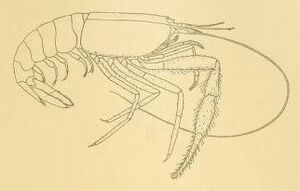Typhlocaris galilea facts for kids
Quick facts for kids Typhlocaris galilea |
|
|---|---|
 |
|
| Male. Plate from Calman, 1909 | |
| Scientific classification |
|
| Kingdom: | Animalia |
| Phylum: | Arthropoda |
| Subphylum: | Crustacea |
| Class: | Malacostraca |
| Order: | Decapoda |
| Family: | Typhlocarididae |
| Genus: | Typhlocaris |
| Species: |
T. galilea
|
| Binomial name | |
| Typhlocaris galilea Calman, 1909
|
|
| Script error: The function "autoWithCaption" does not exist. | |
Script error: No such module "Check for conflicting parameters".
Typhlocaris galilea is a special kind of shrimp that lives only in dark, underground places. It's also known as the Galilean Blind Shrimp because it lives near the Sea of Galilee in Israel and can't see! This unique shrimp is endemic (meaning it's found nowhere else) to just one small pool and a spring that feeds it, located at Tabgha. Sadly, this amazing creature is now critically endangered, which means it's in great danger of disappearing forever. People are working hard to save it!
Contents
What is the Galilean Blind Shrimp?
This fascinating shrimp was first described in 1909 by a scientist named William Thomas Calman. It's considered a "relict species," which means it's a survivor from a very old group of animals that mostly died out.
The Galilean Blind Shrimp is semi-transparent, so you can almost see through it. It doesn't have eyes because it lives in complete darkness underground. Adult shrimp are about 3 inches (7.6 cm) long. Scientists believe they mostly eat a tiny red worm called Isochaeta israelis, which also lives in their unique habitat.
Where Does the Galilean Blind Shrimp Live?
This shrimp is only found in one very specific place in Israel. Its home is a chamber of an old Roman cistern (a tank for storing water) called Ein-Nur octagonal pool. This pool is private property, belonging to a monastery at Tabgha.
The pool is fed by a warm (about 27 °C or 81 °F), sulphuric, and salty underground spring. This special spring is what makes the water just right for the shrimp to live in.
Protecting the Galilean Blind Shrimp
The Galilean Blind Shrimp is now critically endangered. This means it's at a very high risk of becoming extinct. One big reason for this is that people are taking too much ground water from the area. When this happens, other water can flow into the shrimp's pool, changing its natural mix of chemicals and its temperature. These changes make it hard for the shrimp to survive.
Because it's so rare, the shrimp is legally protected in Israel. In 2013, the Israel Nature and Parks Authority asked the Jerusalem Biblical Zoo for help. They started a special program to breed the shrimp in captivity. The goal is to raise baby shrimp in a safe environment and then release them back into their natural home in the future.
See also
- Ayyalon Cave - a similar ecological niche where a related species lives
 | James Van Der Zee |
 | Alma Thomas |
 | Ellis Wilson |
 | Margaret Taylor-Burroughs |

